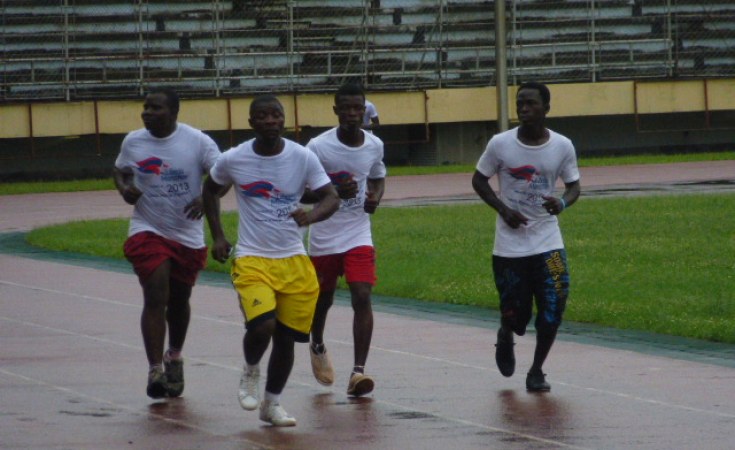AllAfrica's Boakai Fofana has been in training for a couple of months to compete in the 10 kilometer race that is part of the Monrovia marathon on Sunday. After an early preparatory session, he chronicled his experience.
I was breathless, panting heavily after completing 13 laps around the football pitch at Samuel Kanyon Doe Sports Complex in Monrovia. It was my Sunday morning first training session, and it was tougher than I anticipated.
"You've got 12 more to go," our trainer said. I had been on this field a few times before, but only as spectator. Never before had I been the one being watched. "You want to make the beginners category, you have got to do better," he yelled again. It wasn't so hard for him; he was standing there!
I am one of a few dozen runners who gather for training every week to prepare for Liberia's first-ever marathon scheduled to take place on August 28. The event sponsor is BHP Billiton, one of the world's largest mining companies operating in Liberia. The 26.2 mile run around Monrovia is expected to bring together hundreds of Liberian athletes, competing for the grand prize of US$3,000.
Peter Harrington, one of the organizers, describes this as "marathon of reconstruction and recovery, not merely a sprint." He sees each participating athlete as "connecting to the national journey by asking himself 'why am I doing this?'"
He says the marathon can help change the country's image and help erase "all the negative associations people have about Liberia." At the official launch of the marathon in June, Deputy Youth and Sports Minister Marbue Richards called on all Liberians, including civil servants, to take part as a contribution to "advancing peace."
The runners with whom I have been training each Sunday - often on a rather wet track - have their focus on performance. For many of them, it is about being a Liberian 'Ben Johnson' or 'Marion Jones' – two record-holding runners whose names are well known here.
Liberia hasn't produced a world-class long distance runner as have other African countries like Kenya and Ethiopia. The Liberians competing in track at the Beijing Olympics were all sprinters. "We want to see a Liberian in Rio running the Olympics in 2016," Harrington said.
I have been training in the 10 Kilometers category, which is less demanding than the full marathon. But I didn't want the trainers to think that I'm not serious. After all, I am a regular jogger, even though that's at my own pace.
"How many kilometers will we have run when we round this track 25 times?" I asked the trainer as I grabbed a bag of water from him on my first Sunday at the track. He clearly didn't seem happy with the three of us who were lagging behind. We were now walking, having given up completing 25 laps on the run.
But I received a boost from a fellow sufferer. "You are doing your best ya," said one of the runners coming from behind in typical Liberian lingo. "It's just your first day. You will pick up next week."
More runners have been joining the training each week. Many seem primarily concerned about the health benefits.
I have seen progress each session. Taking to heart the encouragement I received that first week, I progressed to running the 25 laps and have had felt more stamina every week. Now the Marathon is only days away, and I hope I am ready.


